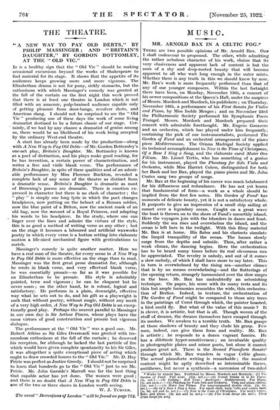THE THEATRE.
" A NEW WAY TO PAY OLD DEBTS," BY PHILIP MASSINGER ; AND " BRITAIN'S DAUGHTER," BY GORDON BOTTOMLEY, AT THE " OLD VIC."
IT is a healthy sign that the " Old Vic " should be making occasional excursions beyond the works of Shakespeare to find material for its stage. It shows that the appetite of its audiences keeps growing more and more vigorous. The Elizabethan drama is not for puny, sickly stomachs, but the enthusiasm with which Massinger's comedy was greeted at the fall of the curtain on the first night this week proved that there is at least one theatre in London which is not filled with an anaemic, pulp-brained audience capable only of getting pleasure from door-bangs, revolver shots, and American slang. I should not be surprised to see the " Old Vic " producing one of these days the work of some living dramatist destined to be a future classic of our stage. Cer-
• tainly, if we had by any chance a dramatist of genius among us, there would be no likelihood of his work being accepted by the ordinary West-end theatre.
A start has already been made by the production—along with A New Way to Pay Old Debts—of Mr. Gordon Bottomley's one-act play, Britain's Daughter. Mr. Bottomley is known as a poet of distinction, and his plays make good reading, for he has invention, a certain power of characterization, and writes a free and virile blank verse. The performance of Britain's Daughter, in spite of these qualities and of an admir- able performance by Miss Florence Buckton, revealed a eomplete lack of any sense of the theatre as distinct from a dramatic sense. Britain's Daughter is dramatic as most of Browning's poems are dramatic. There is emotion ex- pressed in character but there is no clash of character ; the " play " is simply one long lyric in which the poet changes headpieces, now putting on the helmet of a Roman soldier, now the blue paint of a Briton, now the ancient mask of an old hag, now the coronet of a Royal Princess, and adapting his words to his headpiece. In the study, where one can linger over the lines and admire the virtues of the style, this is as good a method of writing verse as any other ; but on the stage it becomes a laboured and artificial waxworks poetry in which every verse is a button setting into elaborate motion a life-sized mechanical figure with gesticulations to match.
Massinger's comedy is quite another matter. Here we have a real man of the theatre, for every scene in A New Way to Pay Old Debts is more effective on the stage than to read. Massinger was the first great prose dramatist for, although he wrote in blank verse, and very effectual blank verse, he was essentially prosaic—so far as it was possible for an Elizabethan to be prosaic. His style is admirably pointed, terse and vigorous ; he can be eloquent but he never soars ; on the other hand, he is robust, logical and satisfactory. He performs in a plain, downright, effective way what he sets out to do, and his gift as a playwright is such that without poetry, without magic, without any merit of a very high order, A New Way to Pay Old Debts is an excep- tionally good play. Perhaps the nearest parallel to Massinger in our own day is Sir Arthur Pinero, whose plays have the same virtues of good construction and prosaic but vigorous dialogue.
The performance at the " Old Vie " was a good one. Mr.
Robert Atkins as Sir Giles Overreach was greeted with tre- mendods enthusiasm at the fall of the curtain ; he deserved his reception, for although he lacked the last particle of fire which would have given complete spontaneity to his Sir Giles, it was altogether a quite exceptional piece of acting which ought to draw crowded houses to the " Old Vic." Mr. D. Hay Petrie was perfect as Justice Greedy. I should not be surprised to learn that hundreds go to the " Old Vic " just to see Mr. Petrie. Mr. John Garside's Marrall was far the best thing that capable actor has yet done. The women were good ; and there is no doubt that A New Way to Pay Old Debts is one of the two or three shows in London worth seeing.
W. J. TURNER.










































 Previous page
Previous page